Genre et inclusion
Au fur et à mesure que les transferts monétaires continuent à se développer, les parties prenantes demandent une meilleure prise en compte des problématiques de genre et d’inclusion car « des transferts monétaires sensibles au genre qui tiennent compte des disparités et répondent équitablement aux besoins de toutes les personnes affectées par une crise ont le potentiel d’avoir un impact positif sur les femmes et les filles en les protégeant davantage et en favorisant leur autonomisation, tout en renforçant les impacts spécifiques au secteur, qui peuvent rendre les ménages et les communautés ayant vécu une crise plus résilient·es et plus autonomes. » (Directives pour le chantier du Grand Bargain sur les transferts monétaires et le genre). La pandémie de COVID-19 a accru l’urgence de l’assistance car elle a affecté les femmes et les groupes exclus en particulier en augmentant la charge de travail de soin, en réduisant les opportunités d’emploi de manière disproportionnée et en exposant les femmes à des difficultés financières plus fortes et à davantage de violences basées sur le genre.
Le CALP Network continue d’ancrer son travail sur le symposium #GenreEtTransfertsMonétaires organisé en 2018 à Nairobi et sur l’engagement inscrit dans le programme pour l’action collective (Agenda for Collective Action) qui en a résulté. Le rapport « La situation mondiale des transferts monétaires en 2020 » fait état de progrès notables en matière de genre et de transferts monétaires, alors que ce domaine était marqué par des lacunes importantes en matière de données probantes dans le dernier rapport. De nouvelles directives ont été produites sur le genre et les transferts monétaires, ainsi que le genre et les VBG, et des efforts ont été réalisés en termes de synthèse et d’identification de données probantes plus rigoureuses. L’attention, portée initialement aux VBG, s’oriente désormais vers l’égalité entre les genres et l’adaptation de la programmation afin qu’elle ne tienne plus seulement compte du genre mais intègre cette problématique de manière transversale, et même transformatrice. Toutefois, bien que nous remarquions des progrès au niveau technique partout dans le monde, cela ne s’est pas traduit par des changements ancrés en termes de planification, de mise en œuvre et de suivi.
Priorités actuelles
Nous continuerons à travailler étroitement avec les responsables du chantier auxiliaire du Grand Bargain sur les transferts monétaires, CARE et ONU Femmes pour mettre en œuvre le plan de travail. Le CALP Network va continuer à encourager les acteurs de l’assistance monétaire à prendre en compte davantage de problématiques afin d’être plus inclusifs, et de favoriser une meilleure compréhension de la manière dont nous pourrions utiliser les transferts monétaires pour ne pas nous contenter de ne pas nuire mais aussi lutter contre ces inégalités socio-économiques par le biais de la prestation d’autres services et modalités de soutien.
Contenu associé

Collected Papers on Gender and Cash Transfer Programmes in Humanitarian Contexts
Report
Existing gender inequalities mean that disasters and conflicts impact women, men, girls and boys differently. Cash based assistance is one of the most significant developments in humanitarian assistance in recent years. But the relationship between gender and cash based assistance in humanitarian contexts is poorly understood. All too often, interventions are designed based on assumptions...

Guide for Protection in Cash based Interventions
Guidelines and Tools
This guide identifies minimum necessary information and key resources needed to help humanitarian practitioners ensure that protection risks and benefits are considered and monitored throughout the cash-based interventions (CBI) program cycle, using a community-based approach and participatory methods as much as possible. It can help to inform CBI in any program context: protection...

Microlearning video: CVA and Gender
Blog Post
This video provides an overview of the relationship between gender and cash and voucher assistance (CVA) structured around the humanitarian project cycle, which include: Assessment and response analysis: How to adjust the assessment processes to achieve a more accurate reflection of gender and markets. Design and implementation: How to use methods and protocols to reduce the potential...

Better Gender Outcomes in Food Assistance through Complementary and Multi-Modal Programing: Promising Practices Tip Sheet
Guidelines and Tools
This Tip Sheet is excerpted from the research report, “Better Gender Outcomes in Food Assistance through Complementary and Multi-Modal programming,” and gives promising practices by the cycles of project cycle management, as well as at the response level. Additionally, there are expert tips and wisdom practices that support the use of a gendered approach in development or humanitarian...

Cash & Voucher Assistance and Gender-Based Violence Compendium
Guidelines and Tools
The Compendium is intended as a companion to the 2015 Inter-Agency Standing Committee (IASC) Guidelines for Integrating Gender-Based Violence Interventions in Humanitarian Action and its companion resource, the GBV Pocket Guide. The guidance was developed through the efforts of 15 organizations who contributed expertise in the inception, design and review of the document. The process was led...

Cash and Voucher Assistance that Works for Women: 6 lessons from the field
Report
Building on CARE’s commitment to be ‘cash ready’ to achieve breakthroughs with and for women and girl, CARE commissioned a study –in Malawi, Haiti, Jordan, the Philippines and Niger–on gender-sensitive CVA that allowed actual CVA recipients to frame the discussion. This is a brief from the research “What Does Gender-Sensitive Cash and Voucher Assistance Look Like?” and presents...
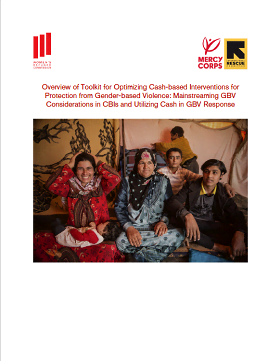
Toolkit for Optimizing Cash-based Interventions for Protection from Gender-based Violence
Guidelines and Tools
Efforts to prevent and respond to GBV should be a priority for all actors in all humanitarian response operations from the very start. By mainstreaming GBV considerations in CBIs throughout the program cycle and by utilizing cash within GBV case management services, cash can be optimized as a tool to enhance the protection of crisis- and conflict-affected populations and to mitigate risks of...
Thematic lead
Contenu récent

Walking the Talk: Cash Transfers and Gender Dynamics
Case Study
Concern Worldwide (Concern) and Oxfam GB (Oxfam) jointly commissioned this report to look at the impacts of cash transfers (CTs) on gender dynamics both within households and communities. This report was commissioned because of the agencies’ concerns that while CTs, now being used in many different...
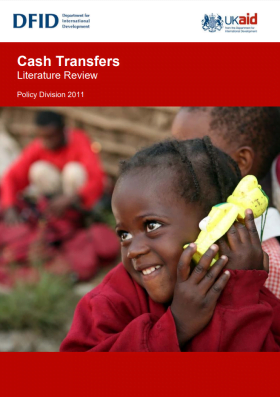
DFID Cash Transfers Literature Review
Report
This paper provides a synthesis of current global evidence on the impact of cash transfers in developing countries, and of what works in different contexts, or for different development objectives. Cash transfers are direct, regular and predictable non-contributory cash payments that help poor and...
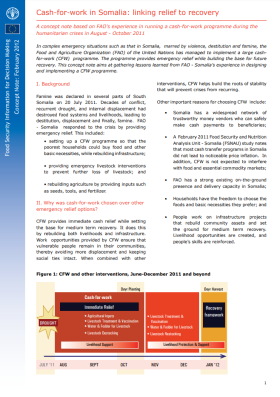
Cash-For-Work in Somalia: Linking relief to recovery
Policy paper
In complex emergency situations such as that in Somalia, marred by violence, destitution and famine, the Food and Agriculture Organization (FAO) of the United Nations has managed to implement a large cash-for-work (CFW) programme. The programme provides emergency relief while building the base for...
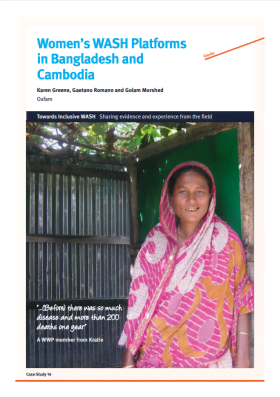
Women’s WASH Platforms in Bangladesh and Cambodia
Case Study
Oxfam’s multi-country portfolio is located in more than 100 remote rural communities in six countries and is funded by AusAID’s Civil Society Organisation WASH Fund. The water, sanitation and hygiene (WASH) projects in Bangladesh and Cambodia deliver multiple outcomes including improving water and...
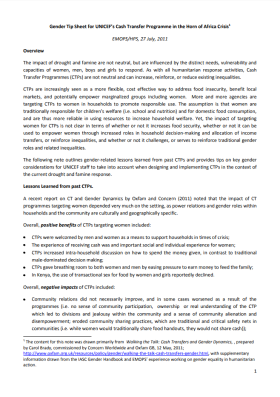
Gender Tip Sheet for UNICEF’s Cash Transfer Programme in the Horn of Africa Crisis
Guidelines and Tools
The content for this note was drawn primarily from Walking the Talk: Cash Transfers and Gender Dynamics, prepared by Carol Brady, commissioned by Concern Worldwide and Oxfam GB, 12 May, 2011. Drafted for UNICEF staff, this note outlines gender-related lessons learned from past CTPs and provides tips on...
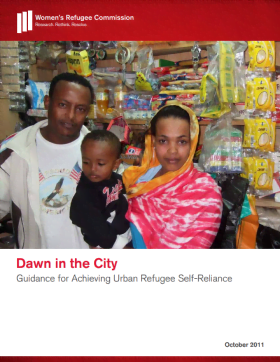
Dawn in the City: Guidance for achieving urban refugee self-reliance
Report
More than 50 percent of refugees live in urban areas. Eighty percent are hosted by developing nations, in cities ill-equipped to guarantee their protection. The majority are marginalized due to their legal, economic and social status. They frequently lack sufficient legal and social...
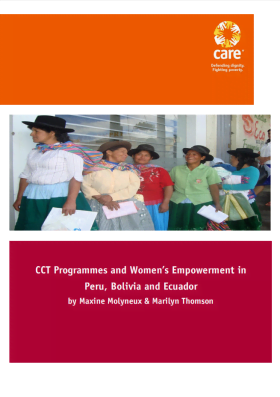
CCT Programmes and Women’s Empowerment in Peru, Bolivia and Ecuador
Report
Latin America’s efforts to alleviate poverty have resulted in reducing poverty in twelve countries, most strikingly in Mexico and Brazil. The adoption of Cash Transfer programmes in much of the region is credited with helping to bring this reduction about. These programmes are widely promoted as a cost...
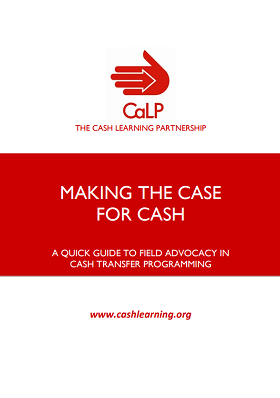
Making the Case for Cash: A field guide to advocacy for cash transfer programming
Guidelines and Tools
Because cash transfer programming (CTP) is still a relatively new way of delivering aid, practitioners may often find that they need to be able to make the case for using CTP as well as address fears across different audiences. This guide aims to support field-level advocacy for cash transfer programming....
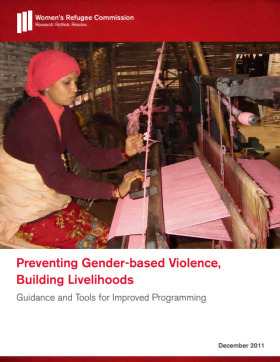
Preventing Gender-Based Violence, Building Livelihoods: Guidance and tools for improved programming
Guidelines and Tools
Conflict and displacement destroy livelihoods and force people to adopt new strategies to support themselves. New livelihood strategies can increase the risk of gender-based violence (GBV). Women often have no safety net; they usually flee with few resources and little preparation and may become...
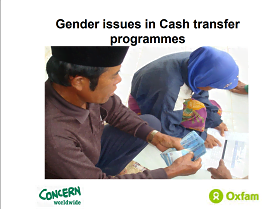
Gender issues in Cash transfer programmes
Presentation
Purpose of the study: To assess the changes in gender power relations within households and in the community, as a result of emergency cash transfer programmes. To review the processes followed by agencies in emergency cash transfer programming and analyse their adequacy from a gender perspective
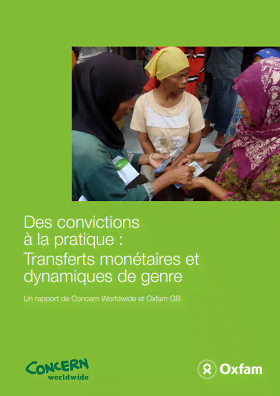
Des convictions à la pratique : transferts monétaires et dynamiques de genre
Rapport
Concern Worldwide (Concern) et Oxfam GB (Oxfam) ont commandité conjointement ce rapport pour étudier les impacts des transferts monétaires sur les dynamiques liées au genre à l’intérieur des familles et des communautés. Ce rapport a été demandé parce que les agences se préoccupaient du...

Case Study: Indonesia – Sumatra 2009
Report
On 30th September 2009 a series of earthquakes struck West Sumatra, not far from the provincial capital of Padang. 13 out of the 19 districts in West Sumatra province were affected. Between earthquakes and landslides nearly 250,000 houses were destroyed or heavily damaged. This case study examines the...
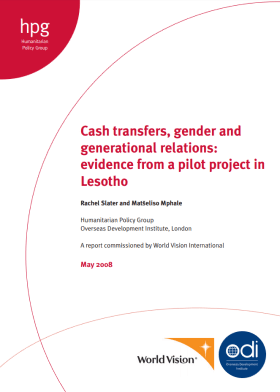
Cash Transfers, Gender and Generational Relations: Evidence from a Pilot Project in Lesotho
Report
Food aid has been the main response to repeated and protracted humanitarian crises in Lesotho since 2002, and during that time it has also been the major part of World Vision’s emergency responses. Along with the government, donors and NGOs, World Vision is increasingly interested in the role that cash...
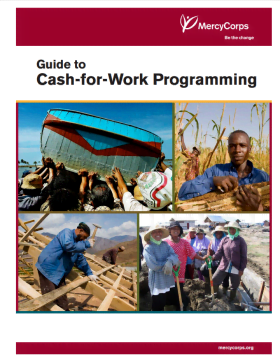
Guide to Cash-for-Work Programming
Guidelines and Tools
Cash-for-Work is a short-term intervention used by humanitarian assistance organizations to provide temporary employment in public projects (such as repairing roads, clearing debris or re-building infrastructure) to the most vulnerable segments of a population. The methodology is relatively new, but its...
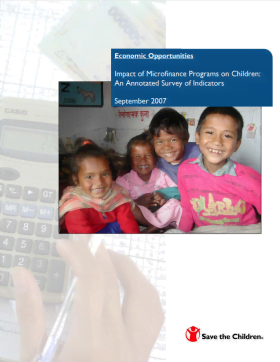
Impact of Microfinance Programs on Children: An annotated survey of indicators
Report
The purpose of this study is to ascertain what indicators have been used by multisectoral, child-focused non-governmental organizations (NGOs), microfinance practitioners and social performance researchers to assess processes that address children’s concerns in operations and the impact of microfinance...
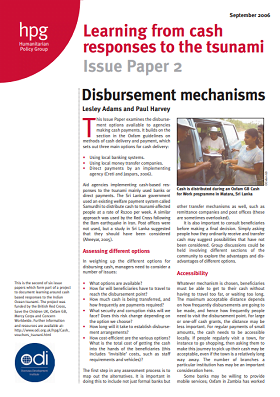
Learning from cash responses to the tsunami: Issue Paper 2: Disbursement mechanisms
Report
This is the second of six issue papers which form part of a project to document learning around cash-based responses to the Indian Ocean tsunami. The project was funded by the British Red Cross, Save the Children UK, Oxfam GB, Mercy Corps and Concern Worldwide. This 5-page Issue Paper examines the...

Mapping the Risks of Corruption in Humanitarian Action
Report
The issue of corruption in emergency relief and rehabilitation is a key concern for practitioners, who invest considerable resources and energy in trying to minimise it. However, it has barely been discussed in policy terms, and little researched. This paper aims to map the risks of corruption in the...

Transferts d’argent: Programmation pour les situations d’urgences
Guides et outils
Un guide compact et concis visant à soutenir les gestionnaires de programmes afin d’évaluer si le cash est la réponse la plus appropriée en cas d’urgence et de choisir entre différents types d’interventions monétaires. Ce guide est basé sur l’expérience d’Oxfam GB sur cinq ans...

Cash Transfers in Emergencies: Evaluating Benefits and Assessing Risks
Report
In terms of both theory and practice, there appears to be a strong case for cash-based responses to food emergencies where the supply and market conditions are appropriate. Amartya Sen’s work on entitlements offers a solid theoretical base for cash transfers, and the practical experience so far, limited...

Walking the Talk Presentation to the Zimbabwe CTWG May 2011
Presentation
Presentation accompanying the report ‘Walking the Talk – the Impacts of Cash Transfers on Gender Relations’ commissioned by Oxfam & Concern.

